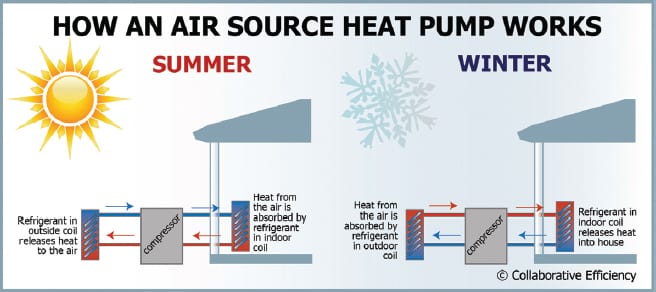Benefits of a Heat Pump
A heat pump is an energy-efficient heating and cooling system that provides numerous benefits for homeowners. In this article, we will explore the advantages of heat pumps and how they can enhance your comfort while reducing energy consumption.
Cost Savings
One of the primary benefits of a heat pump is its ability to save you money. Unlike traditional heating and cooling systems, heat pumps do not generate heat by burning fuel. Instead, they transfer heat from the air or ground, making them highly efficient. This efficiency translates into lower energy bills, especially in moderate climates where heat pumps can be used year-round.
Energy Efficiency
Heat pumps are known for their exceptional energy efficiency. They can provide up to four times more heating or cooling energy than the electricity they consume. By utilizing renewable energy sources, such as the heat in the air or ground, heat pumps significantly reduce greenhouse gas emissions and help combat climate change.
Year-Round Comfort
One of the key advantages of a heat pump is its ability to provide both heating and cooling. During the colder months, the heat pump extracts heat from the outside air or ground and transfers it indoors, keeping your home warm and cozy. In the summer, the process is reversed, and the heat pump removes heat from your home, providing a cool and comfortable indoor environment.
Environmental Friendliness
Heat pumps are considered environmentally friendly due to their low carbon footprint. By utilizing renewable energy sources, heat pumps reduce the reliance on fossil fuels and contribute to a greener future. With the increasing focus on sustainability, installing a heat pump is a step towards reducing your environmental impact.
Improved Indoor Air Quality
Heat pumps not only heat or cool your home but also help improve indoor air quality. They circulate and filter the air, removing dust, allergens, and other pollutants. This can be particularly beneficial for individuals with allergies or respiratory conditions, as heat pumps create a healthier indoor environment.
Long Lifespan
Heat pumps are known for their durability and long lifespan. With proper maintenance, a heat pump can last up to 15 years or more. This longevity makes them a cost-effective investment, providing reliable heating and cooling for an extended period.

In summary, heat pumps offer a range of benefits, including cost savings, energy efficiency, year-round comfort, environmental friendliness, improved indoor air quality, and a long lifespan. By choosing a heat pump for your heating and cooling needs, you can enjoy enhanced comfort while reducing your carbon footprint. Upgrade to a heat pump today and experience the advantages it brings to your home.
Frequently Asked Questions about the Benefits of Heat Pumps
1. What are the advantages of using a heat pump for heating and cooling?
A heat pump offers both heating and cooling capabilities, making it a versatile solution for year-round comfort. It is energy-efficient, environmentally friendly, and can provide consistent temperature control.
2. How does a heat pump help save on energy costs?
Heat pumps transfer heat from one place to another, rather than generating it. This process requires less energy compared to traditional heating or cooling systems, resulting in lower energy bills.
3. Are heat pumps environmentally friendly?
Yes, heat pumps are considered environmentally friendly because they do not burn fossil fuels to create heat. Instead, they use electricity to transfer heat and can even be powered by renewable energy sources like solar power.
4. Can a heat pump improve indoor air quality?
Heat pumps have built-in air filtration systems that can help remove dust, allergens, and other pollutants from the air, thus enhancing indoor air quality and promoting a healthier living environment.
5. Do heat pumps require regular maintenance?
Like any HVAC system, heat pumps do require regular maintenance to ensure optimal performance. It is recommended to schedule annual maintenance checks, including filter replacement and inspection of the system components.
6. Can a heat pump be used in colder climates?
Yes, heat pumps can still operate efficiently in colder climates. However, in extremely low temperatures, they may require supplemental heating to maintain desired indoor temperatures.
7. Are heat pumps noisy?
No, heat pumps are generally quieter compared to traditional HVAC systems. The noise level is typically minimal, allowing for a peaceful and comfortable indoor environment.
8. How long do heat pumps usually last?
With proper maintenance, heat pumps can last between 15 to 20 years. Regular servicing and timely repairs can extend the lifespan of the system.
9. Can a heat pump help dehumidify the air?
Yes, heat pumps can dehumidify the air as they remove moisture during the cooling process. This feature can be particularly beneficial in humid climates or during the summer months.
10. Are there any government incentives for installing a heat pump?
Yes, many governments offer incentives, tax credits, or rebates for installing energy-efficient heat pumps. Check with your local authorities or energy providers to learn about potential savings or financial assistance programs.




